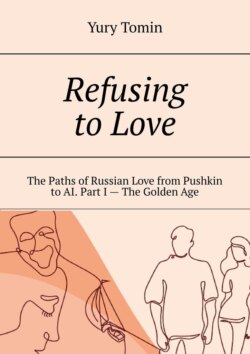Читать книгу Refusing to Love. The Paths of Russian Love from Pushkin to AI. Part I – The Golden Age - Yury Tomin - Страница 6
IV
ОглавлениеThe poet and love. A genius of pure beauty. The consonances of divine harmonies. Lyrical hero. Tragedy of loneliness. The emptied heart. The science of tender passion. The fateful lot
Alexander Sergeyevich Pushkin (1799—1837)
Even before he met Natalia Goncharova, Alexander Pushkin, judging by his own" Don Juan list», repeatedly admired the manifestations of divine beauty, which he noted in the women he knew and the amazing feelings they aroused in his soul («and divinity, and inspiration, and life, and tears, and love»). At the age of 25 he wrote his famous poem:
I can recall that magic moment
When you first came into my sight
Like fleeting vision, like an omen
Of pure beauty and delight.
The poet’s soul is like a unique musical instrument tuned to the consonances of divine harmonies. The inspiration generated by contemplated beauty is united with love. All facets of love – attraction, closeness, affection, understanding, admiration, enjoyment – are blessed with inspiration as the highest thrill of the soul. (It is no coincidence that lovers write and read poetry to each other.) Take all this to a high degree of mental acuity and art talent, compare it to the poet’s surrounding reality, and you get a picture of a fate doomed to the tragedy of solitude.
«The Romantic conception of man proceeds from the notion of his oneness, isolation, wrenching from all earthly ties,» noted the famous cultural scientist Yu. Lotman in his analytical essay on the poets of the 19th century and pointed out the essence of the tragedy of their lyrical heroes, which «consists in the contradiction between the attempts to break through to another „I“, the desire for understanding, love, friendship, connection with the people, appeal to posterity and the impossibility of such contact, because it would mean the loss for „I“ of its exclusivity».
In this vein, the depth of experience arising from the desolation of the heart as a result of a series of infatuations and disappointments, expressed in Alexander Pushkin’s poem written in 1821, becomes understandable:
I have endured my desire,
I’ve ceased to love my fairy dreams,
And only fruit of hearty fire —
My sufferings have stayed, it seems.
And under storms of cruel kismet
My blooming spirit quickly died,
I waited for the end, I missed it.
I’m feeling loneliness inside.
So that enveloped by the blow
Of cold wind and stormy flaws
A leaf which is belated, sole,
Vibrates on bare branch in pause…
There is no doubt that Pushkin’s genius wrapped all facets of romantic love – divine delight, «jealous sorrow» and «yearning laziness» – in a «gilded shell» and presented it to his descendants, who are free only to admire the shiny wrapping or share the bitterness and sweetness of love experiences together with the poet. Along with the ability to respond with all his soul to the heart’s feelings with their joy of divine inspirations from «miserable foolishness» and fear of disappointment from «flaming contagion» Alexander Pushkin described in amazing detail the ability to coldly hypocritically manipulate feelings by the rules of «science of tender passion», which was typical for «young rogue» Eugene Onegin, whom he considered his friend:
How well he donned new shapes and sizes —
startling the ingenuous with a jest,
frightening with all despair’s disguises,
amusing, flattering with the best,
stalking the momentary weakness,
with passion and with shrewd obliqueness
swaying the artless, waiting on
for unmeant kindness – how he shone!
then he’d implore a declaration,
and listen for the heart’s first sound,
pursue his love – and at one bound
secure a secret assignation,
then afterwards, alone, at ease,
impart such lessons as you please!
It seemed that the poet’s earthly path of true sincere love was complete. In 1828 he shared his new state of mind with an old acquaintance: «I confess, madam, the noise and bustle of Petersburg has become completely alien to me – I can hardly bear it.» Friends also notice the change, seeing as previously indefatigable Pushkin «spent whole days in silence, lying with a pipe in his mouth on the couch.» About what «waves, poems and ice» converged in his soul with what «stone, prose and flame,» we can only guess, for example, referring to a mention in a letter to a friend between times about the «genius of pure beauty,» Madame Kern, «whom with the help of God, I f… the other day.» Reflection came to the decision to marry. Surprisingly, these cold-blooded considerations were swept up by love, which suddenly appeared in the life of a poet now as a fateful lot.
